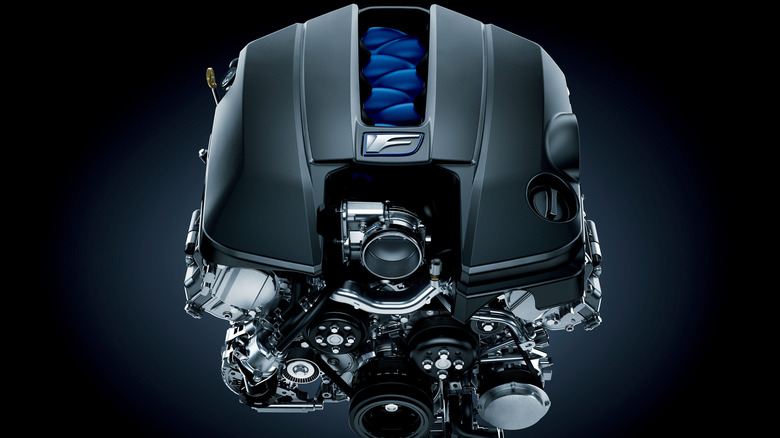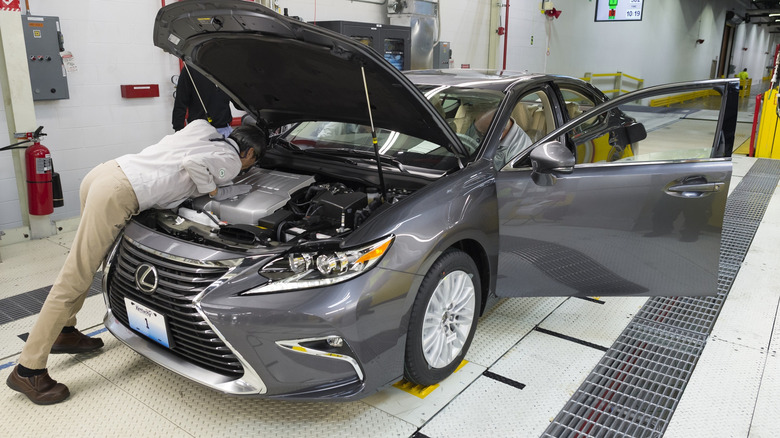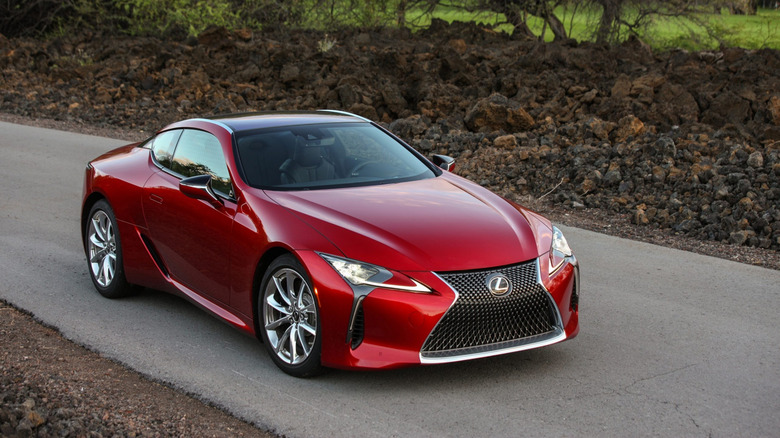Do Lexus And Toyota Engines Come From The Same Factory?
It's no big secret, even for casual consumers, that Lexus is closely related to Toyota. The story of how Toyota founded and ambitiously developed the Lexus name brand is well known. Lexus has remained one of the automotive industry's great success stories, leveraging Toyota's massive power to become a major luxury car brand in a very short time.
But how closely are Lexus cars related to their Toyota cousins? Are Lexus and Toyota engines different? Are the engines built in the same factory? The answer varies a lot depending on which Lexus model you are talking about. While some modern Lexus cars are very closely related to Toyotas, carrying over the same drivetrains, others use parts and engines that are more Lexus-specific.
For many years, the difference between a Lexus and a Toyota simply depended on which global market you were looking at. For example, take the ambitious, groundbreaking Lexus LS 400 sedan, the flagship model for the brand's launch. In America, the LS was a pivotal car that would help put the new luxury brand on the map. In the Japan home market, where there was no Lexus brand until 2005, the LS was sold and marketed as the Toyota Celsior.
Is a Lexus more than just a fancy Toyota?
Though the LS was developed to help launch the Lexus brand, both it and its Toyota-badged counterpart were built alongside other Toyota models in Japan. And its new V8 engine would also be used in Toyota vehicles like the Crown. A decade later, it was the same story with the new 1999 Lexus RX300. In America, the RX300 was another groundbreaking new product, being considered the first-ever luxury crossover SUV. In Japan, the same car was sold not as a Lexus, but as the Toyota Harrier.
The Lexus ES sedan, which debuted alongside the LS 400 for the brand's launch, has always been closely related to the Toyota Camry, often using the same V6 engine from the Camry. And for a decade now, the Lexus ES has been built at the same Georgetown, Kentucky, factory that handles the Camry.
While there was never a factory opened specifically for Lexus cars or engines, Toyota Motor Kyushu is currently the closest thing to a Lexus-only operation, building a number of Lexus CUV and sedan models for export around the world. But still, the Kyushu-built Lexus NX is, for the most part, a luxury version of the Toyota RAV4. Then there are oddities like the Lexus LBX Morizo RR, which is basically a Toyota GR Corolla wrapped in the body of subcompact crossover SUV.
Proud Toyota DNA
There are some vehicles and engines, however, that could be considered more Lexus-specific. The naturally aspirated Toyota 5.0-liter 2UR-GSE V8 engine, for example, has been used exclusively in Lexus-branded road cars, including the LC 500, RC F, and IS 500. Though it's made in a factory alongside other Toyota vehicles and engines, it's about the closest you can get right now to a dedicated "Lexus" engine.
But the most uniquely Lexus model of all time is easily the LFA supercar. Not only did the Lexus LFA use an exotic, bespoke V10 engine, but its entire carbon fiber-reinforced monocoque platform was unique from the ground up, sharing nothing with any other Toyota or Lexus product. But even this hand-built exotic and its engine were still assembled inside the same Toyota Motomachi factory that also produces more mainstream Toyota engines and vehicles.
Though Lexus has fully developed its own personality when it comes to exterior and interior styling, luxury appointments, and refinement, you usually don't need to look far to find the Toyota DNA underneath, especially when it comes to engines and powertrains. And given Toyota's strong reputation for reliability and longevity, for most buyers, that's likely to be more of a selling point than a drawback.


